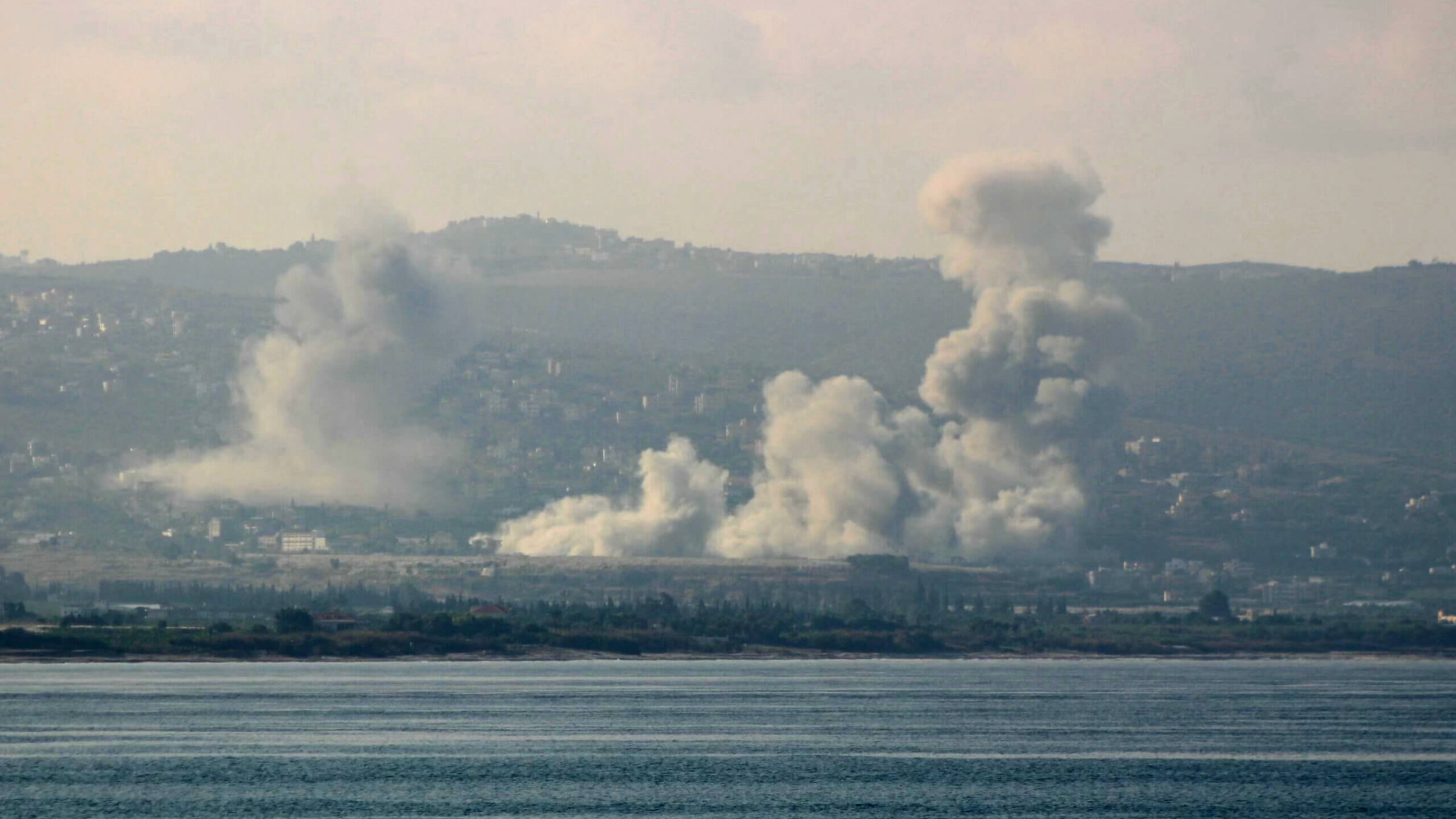With Hezbollah and Iran, war is Israel’s only reasonable option
Iran and Hezbollah are existential threats to Israel. Military means are the best way to guarantee Israel’s safety

A picture taken from the southern Lebanese city of Tyre shows smoke rising from the site of an Israeli strike targeting southern villages on October 13, 2024, amid the continuing war between Hezbollah and Israel. Photo by AFP via Getty Images
Anyone invested in Israel’s survival ought to support its military campaigns against Hezbollah and (expectedly) Iran. It’s a sign that Israel is finally reclaiming control over its safety and security.
And yet, a growing anti-war voice is decrying Israel’s military actions as unnecessary and hawkish escalations. War, it insists, cannot substitute for diplomatic resolution.
But that sentiment is based on a dangerous fantasy: that pacifism works in the Middle East. In reality, if Israel cannot sufficiently debilitate both Hezbollah and Iran, it will leave itself vulnerable to existential peril in the future — and next time, its foes might not fail.
If Oct. 7 taught Israel anything, it is that its long-standing strategy of deterrence against the regional actors seeking its destruction was in truth only successful in weakening Israel. Like Hamas, Hezbollah and Iran provided the illusion of docility to dupe Israel and the world into believing they were controlled.
The New York Times recently discovered that Hamas sought Hezbollah and Iran’s participation in its Oct. 7 attack for several years — the only inhibitions in Lebanon and Tehran concerned Hamas’ timing, not objective. It was only the IDF’s sabotage of Hezbollah’s own Oct. 7-like plans that prevented further carnage that week. Still, it did not stop the terrorist organization’s unprecedented rocket fire beginning on Oct. 8, 2023. As a result, tens of thousands of Israelis still cannot live in their homes up North.
The status quo cannot continue. So, the question becomes, what should Israel do next?
“There is no political resolution” for either Iran or Hezbollah, says Lazar Berman, the Times of Israel’s diplomatic reporter, because both actors are “dedicated to Israel’s destruction.”
Berman added that “interim agreements” with the two would only “serve their interests and give them space to regroup and rearm.”
Efraim Inbar, director of the Jerusalem Institute for Security and Strategy, agreed.
He believes the only appropriate response Israel can take is a military one.
“What we can do is to reduce the appetite for attacking Israel by exacting a price now,” Inbar told me over email. “A ceasefire now helps Israel’s enemies and invites aggression later on.”
Hezbollah capitalized on that invitation over this last year. It is only Israel’s military actions — a beeper attack, successive assassinations of Hezbollah, and now a ground invasion into Lebanon — that are successfully crippling the terrorist group. That must continue until, at the very least, Israelis can return to their homes up North.
Iran, on the other hand, has haunted Israel with existential dread for decades. Aside from its long-range ballistic missile supply and its sponsorship of the terrorist proxies surrounding Israel — both of which make the country a formidable threat to Israel’s well-being — Iran’s nuclear capabilities remain the most prescient danger.
Some blend of sanctions, diplomacy, and deterrence has been Israel and the United State’s traditional strategy to prevent Iran from building a nuclear bomb. We can see today that it has categorically failed: According to experts, Iran is days from developing a bomb’s worth of highly enriched uranium necessary, and possibly months from the bomb itself. That would be catastrophic for Israel.
Even the United States has changed its tune on how to approach Iran. Vice President Kamala Harris recently promised that “all options are on the table” to prevent Iran from procuring nuclear weapons.
Military action on Israel’s part is necessary — against Hezbollah and Iran.
Still, Israel’s good-faith opponents argue that Israel cannot take down either Hezbollah or Iran, and its attempts to do so will only escalate a bad situation into a regional-wide conflict. By the end, they say, Israel will be losing a lot more than it stands to gain.
Israel’s successes against Hezbollah thus far discredit claims against its abilities to handle the terrorist group, and Israel’ allegiance with the United States reinforces its own strength against Iran. As demonstrated with Hezbollah, Israel’s intelligence and strategic capabilities are far beyond what many can expect.
At the same time, I recognize the fearful prospects of what further violence can bring to the Middle East. But those fears do not recognize where the region stands today.
“The only way to end the war of attrition conducted by Iran and Hezbollah is escalating in the ladder of violence,” Inbar says. “There is already a regional war. A ceasefire now will only prolong the regional war.”
In theory, we should all be pacifists. War is brutal, bloody, and destructive. It’s not for nothing that General Sherman declared, “War is hell.”
Israeli society was built on the battlefield fighting for its survival across decades — its citizens do not seek war.
At the same time, idealism cannot substitute for reality. Iran and Hezbollah pose existential threats to Israel, and military means are the best way to guarantee Israel’s safety. Denying that accomplishes nothing — except endangering Israel’s existence.















